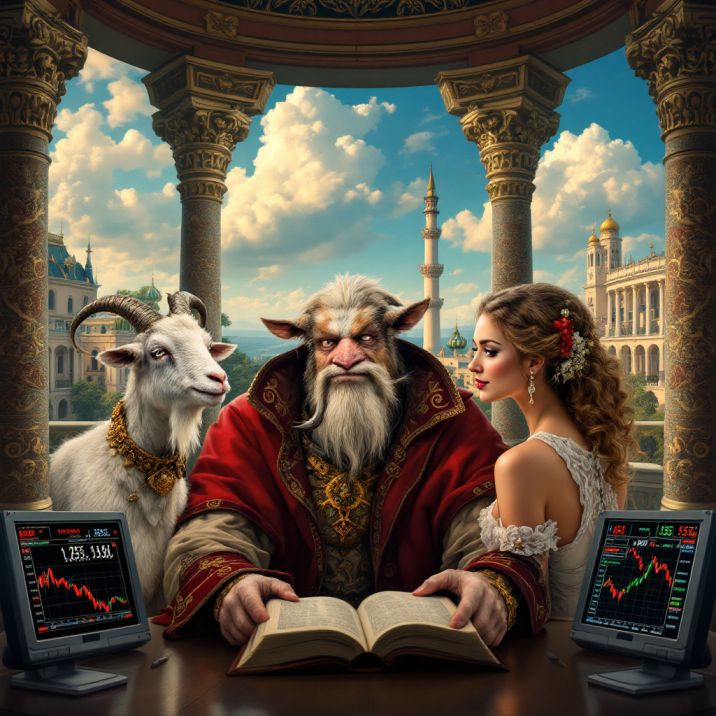
First-Level Thinking: Beware the Pitfalls
Nov 22, 2024
Introduction
In the vast arena of human endeavour, the difference between mediocrity and greatness often hinges upon the calibre of one’s thinking. First-level thinking, superficial and reactionary, is akin to the stubborn gait of a bastard mule—unyielding, shortsighted, and bound by immediate impulses. In contrast, the wise stallion symbolizes profound insight, strategic foresight, and the courage to tread paths less travelled. This essay delves into the perils of first-level thinking, exploring how mass psychology, cognitive biases, lemming-like behaviour, and a lack of common sense can lead individuals and societies astray. We illuminate the path towards second-level thinking by examining the wisdom of sages, philosophers, and investors from antiquity to the modern age. This paradigm shields us from collective folly and transforms crises into opportunities.
Mass Psychology and the Herd Mentality
Mass psychology wields a formidable influence over human behaviour. The phenomenon where individuals, swept by the tide of collective emotion, abandon personal judgment in favour of group consensus is as ancient as civilization. This herd mentality often leads to irrational decisions, as people follow the crowd without scrutinizing the direction or destination.
Consider the tragic tale of the South Sea Bubble in the early 18th century. Investors, gripped by speculative fervour, poured fortunes into the South Sea Company, lured by promises of untold wealth from trade with the Americas. As stock prices soared, so did the mania, disconnected entirely from the company’s prospects. When reality pierced the bubble, financial ruin was widespread. The masses, in their blind pursuit, had overlooked the fundamental discrepancies between hype and substance.
The venerable Greek philosopher Aristotle cautioned against surrendering to collective impulses. Emphasizing the importance of rationality; he posited that true knowledge stems from individual contemplation rather than mass acceptance. “It is the mark of an educated mind to be able to entertain a thought without accepting it,” he asserted. Aristotle recognized that the allure of the crowd can mute the voice of reason, leading to decisions that satisfy immediate desires but disregard long-term consequences.
In modern times, social media amplifies mass psychology exponentially. Viral trends, often devoid of merit, capture global attention in mere hours. The challenge lies in resisting the gravitational pull of the majority, discerning value beyond popularity, and asserting one’s judgment amidst the clamour.
Cognitive Biases and Their Impact
Cognitive biases are embedded in the human psyche—systematic deviations from rational judgment that affect decisions and perceptions. While evolutionary in origin, these mental shortcuts often lead us astray in complex environments. Confirmation bias, for instance, prompts us to favour information that aligns with our preconceptions, dismissing evidence that contradicts them. The availability heuristic causes us to overestimate the importance of information that readily comes to mind, often recent or emotionally charged events.
The financial markets vividly illustrate the havoc wrought by cognitive biases. Investors, swayed by recent trends, frequently buy high and sell low, chasing past performance instead of anticipating future potential. During the housing boom preceding the 2008 crisis, the widespread belief that property values would perpetually rise fueled risky lending and borrowing practices. The collective oversight of warning signs exemplified how cognitive biases can cascade into systemic failures.
The esteemed Chinese philosopher Confucius espoused the virtues of self-awareness and critical reflection. “Real knowledge is to know the extent of one’s ignorance,” he taught. Acknowledging our susceptibility to biases opens the door to deliberate correction. Confucius recognized that wisdom lies not in accumulating facts but in continuously scrutinising our thought processes.
In an age of information, the capacity to discern becomes increasingly crucial. Understanding and mitigating cognitive biases enhance our ability to make sound decisions and avoid errors that the unexamined mind readily courts.
Lemming Theory and Common Sense
Though scientifically inaccurate regarding the creatures’ behaviour, the lemming metaphor aptly captures the human propensity for collective self-destruction. It underscores the dangers of uncritically following others, especially when the path leads towards peril. Often heralded as a guiding principle, common sense can become a veneer for complacency when it substitutes genuine understanding with accepted norms.
The dot-com bubble of the late 1990s serves as a cautionary tale. As internet companies with unproven business models attracted astronomical valuations, investors rushed in, driven by fear of missing out. Traditional metrics for assessing a company’s worth were discarded in the frenzy. The market shed trillions in value when the bubble burst, and many fortunes were lost overnight.
Sun Tzu, the ancient Chinese military strategist, offered profound insights into strategy and perception. In “The Art of War,” he proclaimed, “All warfare is based on deception.” Understanding the true nature of situations beyond appearances is vital. Sun Tzu emphasized the importance of intelligence and forethought over brute force or blind action.
Applying this wisdom, we recognize that common sense must be continually refined through knowledge and critical thinking. Blind acceptance of prevailing beliefs can lead to disastrous outcomes. Instead, we should cultivate a mindset that questions assumptions, seeks evidence, and embraces informed scepticism.
Second-Level Thinking vs. First-Level Thinking
First-level thinking is simplistic, reactive, and often selfish. It focuses on immediate appearances and straightforward conclusions without considering deeper implications. Second-level thinking, conversely, is complex, contemplative, and strategic. It involves analyzing the interplay of variables, anticipating reactions, and understanding the broader context.
In investment, first-level thinking might conclude, “Company X’s earnings are up; the stock will go up.” Second-level thinking, however, examines whether the earnings beat expectations, if the growth is sustainable, and how the market has already priced in the news. This deeper analysis often reveals opportunities that first-level thinkers overlook.
Warren Buffett, the Oracle of Omaha, epitomizes second-level thinking. His investment philosophy emphasises intrinsic value and long-term potential rather than short-term market fluctuations. Buffett advises, “Price is what you pay; value is what you get.” He delves beyond surface metrics to understand a company’s worth, often taking positions contrary to popular sentiment.
Buffett’s success underscores the merits of thinking that transcends the obvious. Second-level thinkers can identify undervalued investments and anticipate market shifts by resisting knee-jerk reactions and conducting thorough analyses. This approach requires patience, discipline, and a willingness to stand apart from the crowd.
Market Crashes as Opportunities
While market crashes induce panic and despair for many, they present lucrative opportunities for those who harness second-level thinking. In times of widespread fear, asset prices often plummet below their intrinsic values. Investors who can detach from the prevailing anxiety and assess the fundamental strengths of distressed assets position themselves for significant gains when markets recover.
The Great Recession of 2008 was a period of profound economic turmoil. As financial institutions collapsed and stock markets tumbled, the instinctive reaction was to flee to safety. However, astute investors like John Templeton, a pioneer of global investing, viewed the crisis differently. Templeton famously stated, “The time of maximum pessimism is the best time to buy, and the time of maximum optimism is the best time to sell.”
Templeton and others multiplied their wealth by capitalizing on the undervaluation of quality assets in the subsequent recovery. Their success was not due to fate but to a deliberate strategy recognising the opportunities inherent in market cycles. They transcended first-level reactions of fear, employing second-level analysis to make contrarian investments.
Embracing this mindset requires emotional fortitude and confidence in one’s assessment. It necessitates a clear understanding of market psychology and the ability to act decisively when uncertainty paralyses others.
Embracing Wisdom Over Conformity
To successfully navigate the complexities of life and markets, one must prioritise wisdom over conformity. Acting like a wise stallion involves deliberate thought, strategic planning, and the courage to defy conventional wisdom when necessary. It is a call to elevate one’s thinking, to engage with the subtleties that first-level thinking overlooks.
Lao Tzu, the legendary sage and author of the “Tao Te Ching,” encapsulated this philosophy. “Knowing others is intelligence; knowing yourself is true wisdom. Mastering others is strength; mastering yourself is true power.” His teachings emphasize self-awareness, humility, and alignment with the fundamental truths of existence.
Incorporating Bertrand Russell’s insight, we find a resonant truth: “The whole problem with the world is that fools and fanatics are always so certain of themselves, and wiser people so full of doubts.” Russell highlights the paradox that wisdom often brings an acute awareness of complexity and uncertainty, fostering a cautious and contemplative approach.
By embracing doubt as a catalyst for inquiry rather than a hindrance, we open ourselves to deeper understanding. This stance contrasts sharply with the overconfidence that characterizes first-level thinking and often leads to folly. The wise stallion moves purposefully, informed by a broad perspective and attuned to the subtle currents beneath the surface.
Conclusion
The journey from the impulsive reactions of first-level thinking to the profound insights of second-level thinking is neither easy nor quick. It demands a conscious effort to cultivate critical thinking, self-awareness, and the courage to stand apart from the crowd. Like the stubborn bastard mule, those mired in first-level thinking are confined by their limited perceptions, susceptible to the whims of mass psychology and cognitive biases.
Conversely, embodying second-level thinking, the wise stallion navigates the terrain with elegance and purpose. By analyzing deeper layers of context, questioning assumptions, and anticipating consequences, the wise stallion transforms obstacles into stepping stones.
Market crashes, often feared as harbingers of doom, become gateways to opportunity for those who can see beyond the immediate turmoil. By understanding that fear and greed drive markets to extremes, second-level thinkers position themselves to buy when others sell and to sell when others buy.
Drawing upon the wisdom of Aristotle, Confucius, Sun Tzu, Warren Buffett, John Templeton, and Lao Tzu, we recognize a consistent theme: the paramount importance of thoughtful analysis over-reactive conformity. Bertrand Russell’s observation about the certainty of fools and the doubts of the wise reminds us that humility and reflection are integral to true understanding.
In an era where information is ubiquitous but wisdom scarce, the imperative to rise above first-level thinking is more pressing than ever. Let us strive to be wise stallions, harnessing the power of second-level thinking to chart a course through the complexities of our world. By doing so, we avoid the pitfalls that trap the unwary and seize the opportunities that lead to growth, prosperity, and fulfilment.










